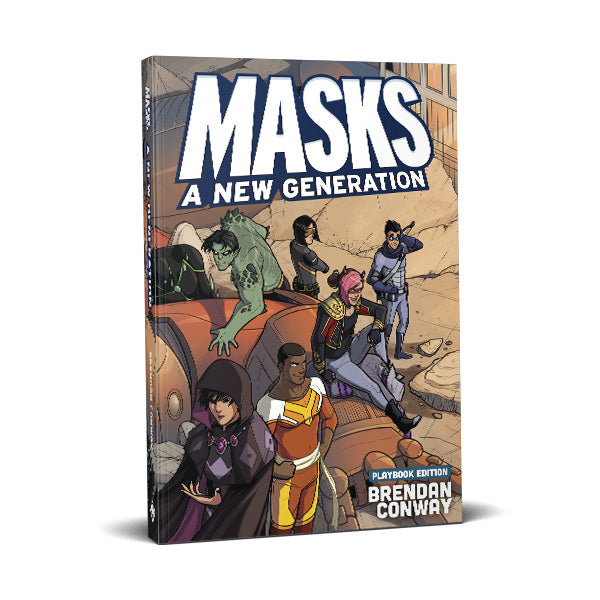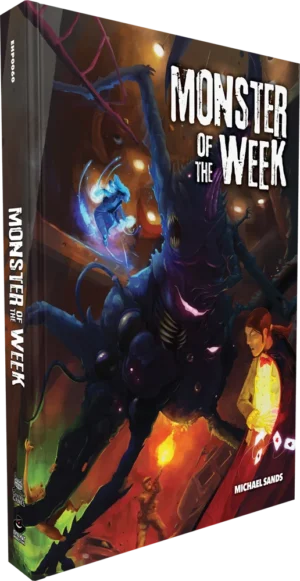Masks: A New Generation Superheroes; Psychological; Powered by the Apocalypse (PbtA); Character Customization; Narrative-Driven; Team-Based
Masks: A New Generation is a tabletop roleplaying game (TTRPG) focused on young superheroes grappling with identity, relationships, and the pressures of adolescence while protecting their city. Powered by the Apocalypse (PbtA), it emphasizes narrative-driven gameplay and collaborative storytelling. The game uses a unique stat system of shifting 'Labels' to reflect the characters' evolving self-perceptions and the influence of others. It's targeted towards players who enjoy superhero stories with a strong emphasis on character development and team dynamics, such as Young Justice, Runaways, or Spider-Man: Homecoming.
Theme and Setting
Masks is set in Halcyon City, a metropolis with a rich history of superheroes spanning multiple generations (Golden, Silver, Bronze, and Modern Ages). This provides a backdrop where masked heroes and villains are relatively commonplace, and the player characters, as the newest generation, must define what being a hero means in this context. The core theme revolves around the challenges of adolescence, including identity formation, navigating relationships, and dealing with authority figures, all while shouldering the responsibilities of superpowers. The game cleverly blends superhero action with personal drama, creating a space for exploring themes of self-discovery, belonging, and the impact of external influences on one's sense of self. The world's tone is generally bright and optimistic, filled with both inspiring heroes and compelling villains, mirroring the style of modern superhero comics and animated series aimed at younger audiences.
Core Mechanics and Rules
Masks uses the Powered by the Apocalypse (PbtA) engine, which prioritizes narrative over rigid rules. Characters are defined by 'Playbooks,' each representing a superhero archetype with unique moves, powers, and story hooks (e.g., The Beacon, The Bull, The Legacy). Instead of traditional stats, characters have 'Labels' â Danger, Freak, Savior, Superior, and Mundane â that reflect how they perceive themselves and how others see them. These labels shift throughout the game based on interactions and experiences, influencing dice rolls and character development.
When a character takes an action, they roll 2d6 and add the value of the relevant Label. A result of 10+ is a full success, 7-9 is a mixed success (with complications), and 6 or less results in a failure, but grants experience. The game also uses conditions such as Afraid, Angry, Guilty, Hopeless, and Insecure. These represent the characters' emotional states and directly impact their ability to perform actions. These conditions are also shed by leaning into them, such as running away to rid oneself of the Afraid condition.
Influence is a key mechanic, representing the relationships between characters. Adults automatically have Influence over the teen heroes, and players can gain Influence over each other through interactions. Influence can be spent to help or hinder someone or to shift their Labels.
Teamwork is represented by Team points, which can be spent to assist allies or even selfishly shift stats. Villain creation is streamlined, focusing on their motivations, powers, and the Conditions they inflict.
What Makes It Unique
Several elements contribute to the uniqueness of Masks. Its focus on the teenage experience within the superhero genre sets it apart from more traditional superhero RPGs. The shifting Labels mechanic is innovative, dynamically reflecting the characters' evolving identities and the influence of external forces. Instead of focusing on strict power levels or combat minutiae, Masks emphasizes character relationships, emotional vulnerabilities, and the challenges of growing up.
The game's narrative-driven approach, typical of PbtA games, encourages improvisation and collaborative storytelling, allowing players to shape the world and the characters' destinies. This is in contrast to games like Mutants and Masterminds, which often get bogged down in the details of power statistics. The mechanics are designed to emulate the tone and themes of teen superhero comics and TV shows, prioritizing the feeling of being a young hero over strict adherence to rules.
Target Audience and Player Experience
Masks is aimed at players who enjoy character-driven stories with a strong emphasis on roleplaying and collaboration. The target audience includes fans of superhero comics and animated series like Young Justice, Teen Titans, Runaways, and Spider-Man: Homecoming, which focus on the personal lives and struggles of young heroes. Players can expect a game that is emotionally engaging, allowing them to explore the challenges of adolescence, the complexities of relationships, and the responsibilities of having superpowers. The game encourages players to define their characters' identities, navigate moral dilemmas, and work together as a team to overcome both external threats and internal conflicts. The rules-light PbtA system makes it accessible to new players, while the rich narrative possibilities offer depth and replayability for experienced roleplayers. The game promotes improvisation from the GM. It is noted that the lack of explicit safety tools is something to be mindful of, but the game can be successfully run with children.


